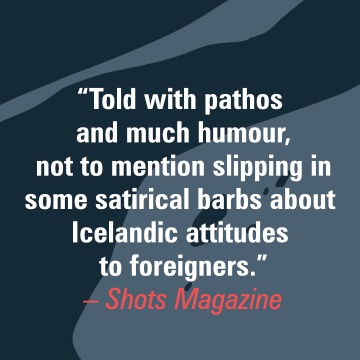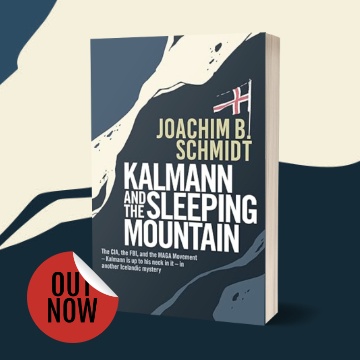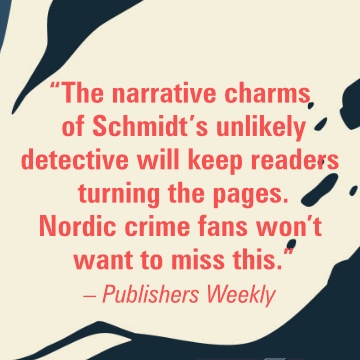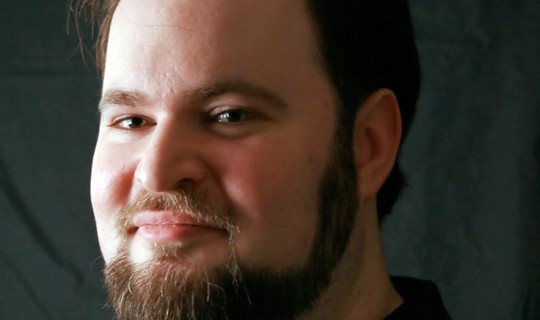
Today we welcome the American author Ari Marmell to the site. The author of Hot Lead, Cold Iron, has a big reputation in horror and fantasy circles, and in his latest novel has blended Celtic mythology with crime fiction. His latest here, Mick Oberon, has a wand holstered where his .44 should be but in most other respects is a classic pulp private eye working the streets of 1930s Chicago. We wanted to know more…
First of all, can you tell us a little about yourself?
Well, let’s see. I’ve been a storyteller most of my life, in one form or another, and wanted to be professional writer since my sophomore year of college. I’ve had some moderate success with it so far, and that’s a good thing, because I really wouldn’t be very good at anything else.
I live in Austin, Texas, with my wife and cat – that’s a list, not an admission of yuckiness – and when I’m not working on novels or short stories, I’m probably working on the details for my next Dungeons & Dragons (or other role-playing game) session.
What will crime fiction lovers love about Hot Lead, Cold Iron?
While I envisioned HLCI as an urban fantasy first and foremost, I did my best to make certain it was also fully intriguing and appealing as a mystery. I’ve included aspects of mysteries in many of my traditional fantasy novels as it is, so pulling that aspect to the forefront was something I found enjoyable and not terribly difficult.
I also tried to make sure that every aspect of the book, beyond the supernatural itself, was historically accurate. The slang, many of Chicago’s locations, and the mentions of historical figures and events, should satisfy any readers more interested in those aspects than the magic.
Genre blending is becoming quite popular, particularly with crime and horror crossovers. Why you have chosen your protagonist, Mick Oberon, to be more in the Hammett/Chandler mould?
I’m not sure this going to be the most satisfying answer, but… it almost wasn’t a deliberate choice. When the character first began to develop in my mind, that’s simply what he was – a PI in 1930s Chicago. I never seriously considered setting his stories anywhere or any time else.
Once I had that, Hammett/Chandler was the obvious direction to go. I enjoy writing sarcastic, somewhat world-weary characters anyway, so that was a good fit. Also, I deliberately wanted to use many of the genre’s tropes – even what some people might consider clichés – to stand out in a starker contrast to the fantasy aspects. So the classic hardboiled detective was a good fit in that regard as well.
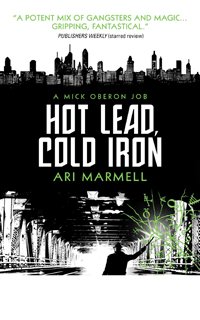
What kind of challenge did it pose to you as a writer to switch genre?
At the core aspects – figuring out characters, basic plot, etc – it wasn’t a huge challenge. As I mentioned above, I’ve included mystery aspects in many of my fantasy novels, so writing one that was more a blend of crime/mystery and fantasy was really just a matter of rebalancing aspects I was already familiar with.
The challenges came in the details. The book required an enormous amount of research – or, I should say, enormous compared to what I’m used to – in order to get the historical and linguistic details accurate. And yet more research into the myths and tales of the fey, since I wanted to draw as much on those as possible as opposed to, in much of my fantasy, simply making details up out of whole cloth.
Tell us a little about the kind of crime fiction that you enjoy reading. Is there a particular author or book that you would recommend to our readers?
I actually came to traditional crime fiction relatively late. For most of my reading career, my experience with mysteries and crime stories came from fantasy/sci-fi/horror books that also included mystery or thriller plotlines. Simon Green and Steven Brust, for instance, both write series that are absolutely fantasy but that also frequently work criminal investigation into the plot.
In terms of more traditional crime fiction, I’m a fan of Hammett, of course. As far as more modern writers, I’ve enjoyed the Agent Pendergast novels by Douglas Preston and Lincoln Child. They tend to have just a touch of the supernatural, but really qualify, in my mind, as mysteries/thrillers first and foremost, with the sprinkling of fantasy a distant second.
What kind of research did you do to prepare for writing Hot Lead, Cold Iron? The period detail, especially the slang, is very convincing.
A lot of the research for specific detail – slang, or the cost of certain goods, for instance – was done online. It starts, of course, with simply searching for appropriate lists. You’d be surprised how many different lists of 30s slang are out there. I knew that I couldn’t rely on any single list, though. Not only was any given list likely to be incomplete, but one can never be certain that any given source online, no matter what they claim, is truly accurate. So there was also a lot of cross-checking involved, making sure multiple lists agreed where they overlapped, that sort of thing.
I binge-watched a handful of noir films, and I read several books on Chicago, organised crime, and fey mythology. I’d say far and away the most helpful book was A Travel Guide to Al Capone’s Chicago. Amazingly helpful in terms of period details, what specific areas of the city looked like at the time, and so forth.
There will be the second Mick Oberon job, Hallow Point, next spring. Can you give our readers a little teaser of that, and are you planning more adventures for Mick after that?
I suppose one might define Hallow Point as Mick’s version of The Maltese Falcon. I don’t mean that literally in terms of specific story beats, but in terms of the overall type of story it is. The Spear of Lugh – one of the mythical treasures of the Tuatha Dé Danann and a highly potent artifact – has somehow made its way to Chicago, and everyone wants to get their hands on it.
It’s a very different sort of mystery than the central story of Hot Lead, Cold Iron, and that was a deliberate choice on my part. I didn’t want the second book of the series to feel in any way like a rehash of the first. As I see the series, some stories will involve Mick traveling to the Otherworld; others will take place entirely in the real Chicago. Some will involve the mob, others won’t. Some will involve primarily human adversaries, some primarily supernatural. And so forth. I want every Mick Oberon book to feel like they’re all part of the same character’s story, but I do not want to lock the books, or myself, into a straightjacket of artificial rules such as ‘every story must include a trip to the Otherworld,’ for instance.
And as the above implies, yes, I have ideas for quite a few Mick Oberon novels beyond these initial two. I sincerely hope I have the opportunity to share them.
Read our review of Hot Lead, Cold Iron here.







